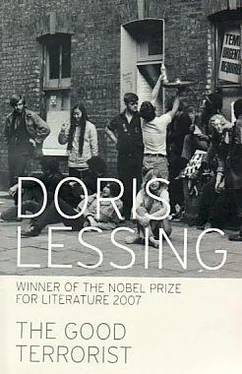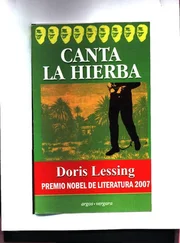Seeing this, Alice felt a little spurt of triumph, then pity. She was glad of this opportunity to look at him unobserved.
She had always thought of her father as attractive, even handsome, though she knew not everyone did. Her mother, for instance, had been wont to call him "Sandman" in critical moods.
Cedric was a solid, tending-to-fat man, pale of skin, lightly freckled, with short fair hair that looked reddish in some lights. His eyes were blue. Alice was really rather proud of his story, his career.
Cedric Mellings was the youngest of several children. The family came from near Newcastle. There were Scottish connections. Cedric's grandfather was a clergyman. His father was a journalist and far from rich. All the children had had to work hard to become educated, and launched. Cedric had been just too young for the war, and for this he had never forgiven Fate.
Unlike his brothers, he did not seem able to get himself together; wasted his time at university, married very young, came to London, did this job and that; wrote a book that was noticed but made no money, then another, a jaunty and irreverent account of a journalist's career in the provinces. This was based on his father's life, and it did well enough to bring in five thousand pounds, a lot of money in the mid-fifties. He saw - Dorothy advising and supporting him - that this was a chance that might not recur. He bought a small printing firm that had gone bankrupt, and because of contacts in the Labour Party and all kinds of left-wing political groups, soon had a bread-and-butter basis of pamphlets, brochures, tracts, leaflets, and then a couple of small newspapers. The firm flourished with the good times of the sixties, and Cedric started the stationer's as a speculation, but it at once did well. The family thankfully left the small shabby flat in Stockwell, and bought a comfortable house in Hampstead. Good times! That was what they all remembered of the sixties, the golden age when everything came so easily. Times of easy friendships, jobs, opportunities, money; people dropping in and out, long family meals around an enormous table in the big kitchen, achievements at school, parties, holidays all over the Continent.
Cedric Mellings had an affair or two, and then so did Dorothy Mellings. Shocks, storms, rages, accusations; long family discussions, the children much involved, things patched up and smoothed over, the family united. But by then the children were growing, growing up, grown, going, going, gone - Alice up north, back to her father's territory, though at first she did not see this.
Cedric Mellings and Dorothy Mellings were alone in the too-large house. Which did not cease to be full of visitors coming and going, eating and drinking. Cedric fell in love with Jane. He went off to live with her. Dorothy remained in the large house.
All gone. Blown away, and gone, the good times, the easy jobs, even, it seemed, the accomplishment, the friends, affection, money.
Cedric and Dorothy had seemed a centre, even an essential one; so many well-known people had been in and out with their politics, books, causes, marches for this and that, demonstrations. There had seemed to be a shine or gloss on Cedric and Dorothy, an aura or atmosphere about them, of success, of confidence. But then... what had happened to all that? Cedric with Jane was a very different matter! For one thing, a much smaller house, because, after all, C. Mellings, Printers and Stationers, had to support two establishments; Cedric and Jane's house did not have that elusive but unmistakable atmosphere of ease, of success. Dorothy, left in the bigger house, alone for a time and later with Alice and Jasper, seemed to have fewer friends. Certainly those who came for a meal with Dorothy Mellings - while Alice was there, with Jasper - tended to come in ones or twos, mostly women, perhaps needing Dorothy's advice, or even to borrow money; divorced friends - so many of the couples that had been to the Mellingses' in the good days, had split up. Or a couple, who talked a lot about how things had been, and how they weren't the same now. If Dorothy gave a party, and it was only a small party, it was an effort, and she appeared to be tired of it all, to have forgotten how, in the sixties and early seventies, parties just happened. They took the house over and sucked in people from everywhere and telephones rang with careless invitations and orders to wine merchants and grocers.
Whereas, for a time, Cedric Mellings had been the ugly duckling of the family turned swan - for who else of his siblings lived this glittering glamorous life? - now there was a shabby-duckling quality again. Anyway, what had it all amounted to? scorned Alice, triumphantly examining that too-pale, anxious, strained face, with beads of sweat on the forehead: printing fucking garbage for this or that bloody faction in the fascist bloody Labour Party, printing dishwater newspapers for bloody liberals and revisionists, sucking up to shitty politicians on the make and bourgeois trash anyway doomed to be swept into the dustbins of history?
It had all been rubbish, all of it. What Alice could not forgive herself for was that she had been taken in by it all.... Well, she had had the sense to get out in time, and meet people who could lead her on the right path....
At last Cedric Mellings sighed, opened his eyes, and, having thought out his position, leaned forward and, without looking at Alice but keeping his eyes down, said, "Very well, you took the money, if you say so. I am sorry about that young man. Tell him to come back and... I am sure we can make it all right. Now, as for you, Alice. I suppose it will be a surprise to you, you live in such a dreamworld, but that thousand pounds is not a sum that the firm can afford to lose. We are suffering from the recession, too, you know. It is touch and go - we might have to fold. The printing firm, not the stationer's." He let out the incredulous, admiring little snort of laughter he usually did when mentioning the stationer's: "Greeting cards! That's the thing. And, of course, the sweets and chocolates and all that sort of rubbish."
Now he did look at Alice, and was able to sustain the look, though it was evident it was a strain, keeping his eyes on his daughter's eyes; he simply did not understand what he was seeing.
"I suppose it is no good asking you to return the money?" he almost pleaded.
At this Alice laughed. The laugh acknowledged, even admiringly, some sort of necessity that Cedric, poor fool, could not begin to understand. He, however, nodded, having understood. He said, "I suppose that Jasper of yours has already got it. Well, I know it is no use saying anything to you about him. You have a blind spot of some kind. But you must understand this: you are not having any more money from me. I see no reason why I should support that - well, let that go. I am very pushed for money, Alice-do you understand that? And it's not just this thousand. A few days ago, some hooligan or other walked into our bedroom, mine and Jane's - and lifted..." Suddenly, as the thought struck him, he jerked back in his chair as if he had been given a minor electric shock and stared at Alice, his jaw literally dropping. Until this moment, that theft had not been connected with Alice. She merely smiled, admitting nothing, but knowing that she need not bother with denials.
Again he had been shocked to the heart, could not speak, sat struggling to order his thoughts. He was breathing shallowly, in quick gasps. Then he fumbled for a cigarette, lit it clumsily, and sat drawing in smoke as if it were a narcotic.
At last he said, "Alice, I don't know.... Now you are a thief? Is that it? Is that how you live? I don't understand." Putting out the cigarette again, as though stubbing Alice out of existence, he said, "I thought it was some hooligan, these kids who come into a house on an impulse...." It was at this point that the next thought hit him, and again he sat staring. "Was that you?" he asked blankly; "did you throw that stone?" He knew it was; this was not a question.
Читать дальше











